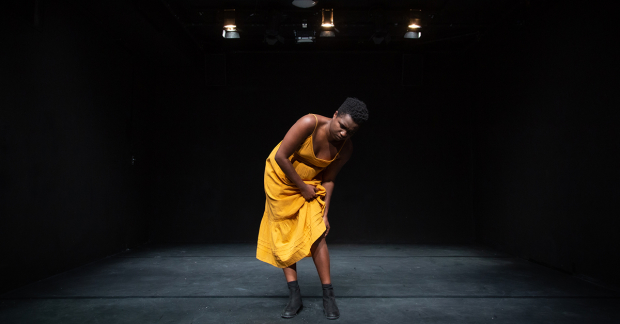Review: Land Without Dreams (Gate Theatre)
Tue Biering’s monologue stars Temi Wilkey and is created by the Copenhagen-based collective Fire&Foxy

© Cameron Slater
"I come from the future," is a line that reverberates throughout Tue Biering's smart monologue, which plays with the now commonplace narrative of 'we're all doomed within a century' to take a wider view of human evolution.
Told in a meta style, a woman, captivatingly played by Temi Wilkey, addresses the audience directly and seduces us with a series of sympathetic, reassuring statements: "People who go to the theatre are always very open-minded"; "I come in peace, do not be afraid"; "It's going to be okay."
But it soon becomes apparent that all is not in fact as rosy as this narrator would have her audience believe. Between scenes she scratches herself incessantly, at one point peeling off skin. There is an underlying sense of danger, of chemical catastrophe, of all the prophecies she eschews in fact coming true.
Created by Fix&Foxy, a Copenhagen-based collective known for their conceptual interpretations of popular culture, Land Without Dreams (Landet Uden Drøme) sits at the border of theatre and performance art. It will not be to everybody's taste. But Wilkey is a bright and engaging presence. She coerces and charms, even while delivering killer blows. "If I told you how things really will be, you'd get scared," she says, like a teacher explaining away a complicated issue to her pupils.
I found myself thinking back to Katie Mitchell's production Ten Billion at the Royal Court, in which scientist Stephen Emmott lectured on the dark implications of population expansion. That show was grounded in fact, this one in myth-making. But there is a stark connection between the two, not least that they both contain dire warnings of imminent apocalypse.
I can't honestly say all of the dense text sinks in, nor can I pretend there are not longueurs in which one's mind drifts to other things – just as the woman tells us it will. But there is something meditative and almost hallucinatory about the piece, which culminates in a striking coup de theatre. Such closing moments create an indelible visual impression and Wilkey handles a challenging undertaking with great poise. I did find that my sympathies for her outweighed any reflections on the metaphor her physical transformation is intended to evoke, but perhaps in some ways that is the point.


![Gate Theatre's <em>Mephisto [A Rhapsody]</em> and <em>Land Without Dreams</em> casting announced](https://www.whatsonstage.com/wp-content/uploads/sites/3/2023/06/137349-1.jpg?w=100)

















